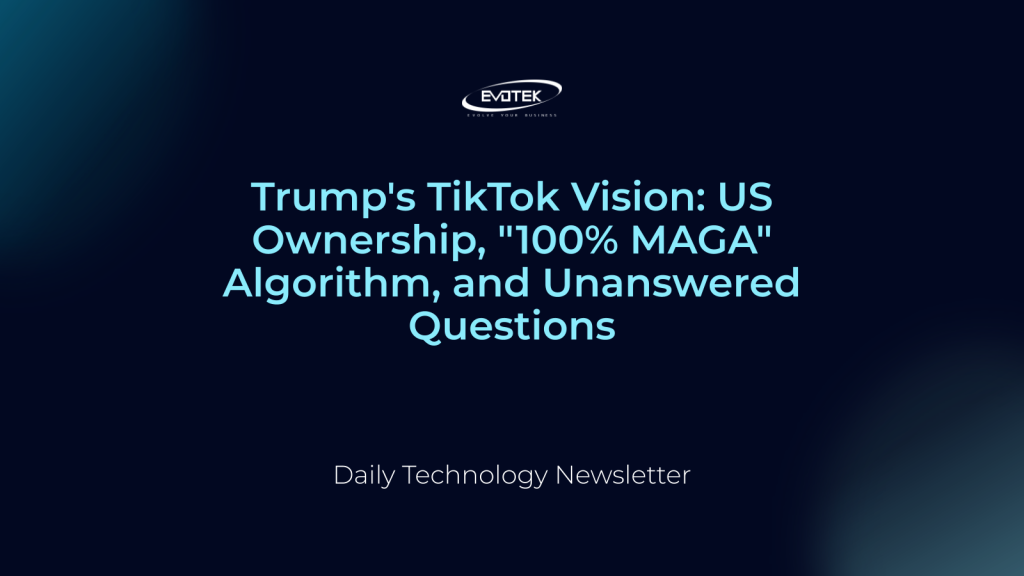A recent executive order signed by Donald Trump aims to fundamentally reshape the popular social media platform TikTok in the United States. Beyond the stated goal of securing American user data and ensuring US control, Trump has openly suggested a desire for the app’s algorithm to be “100 percent MAGA,” raising significant questions about political influence and free speech.
The move comes amidst ongoing concerns about foreign influence and data security surrounding TikTok, currently owned by China’s ByteDance. Trump’s order is designed to comply with legislation prohibiting majority ownership of the app by a foreign adversary, a measure intended to shield Americans from potential espionage or external manipulation of the content algorithm.
Key Players and Proposed Structure
Under the proposed deal, US tech giant Oracle is slated to take charge of securing American TikTok users’ data. The new US venture is expected to be managed by a board of directors, where ByteDance would retain one seat, with the remaining six seats allocated to US investors. This structure is intended to ensure definitive US control over the platform’s operations.
Speculation points to prominent figures like Oracle CEO Larry Ellison potentially filling a board seat, with his son, Paramount Skydance CEO David Ellison, also considered. Additionally, media moguls Rupert Murdoch and his son Lachlan, CEO of Fox Corporation, have been mentioned by Trump as likely participants in the investor group overseeing TikTok’s US operations.
Uncertainty Lingers: China’s Approval and Legal Compliance
Despite Trump’s claims of tentative approval from Chinese President Xi Jinping following a “good talk,” official confirmation from Chinese media remains elusive. Experts previously questioned China’s incentive to proceed with the deal, with ByteDance itself denying sale reports as recently as July.
Further complicating matters, Vice President JD Vance confirmed the new US company’s valuation at approximately $14 billion, a figure significantly lower than some analyst estimates, which could be a point of contention for ByteDance. Critical details surrounding potential concessions made by Trump to secure Xi’s alleged sign-off are also unknown.
The deal’s compliance with the legal requirements of the Protecting Americans from Foreign Adversary Controlled Applications Act is another area of uncertainty, with reports indicating numerous specifics still need to be finalized. Concerns have been voiced by financial analysts, noting a lack of clarity regarding who would control the algorithm, potentially leaving national security issues unresolved.
Free Speech and Political Bias Concerns
Critics are particularly vocal about the implications for free speech and the potential for political bias. Civil liberties advocates, like David Greene of the Electronic Frontier Foundation, warn of the risks of handing over TikTok to allies of a president who has shown a willingness to censor criticism.
Jennifer Huddleston, a senior fellow in technology policy at the Cato Institute, echoes these concerns, highlighting the uncertainty surrounding the US government’s potential influence or oversight over the algorithm. Such involvement, she suggests, could raise significant First Amendment issues regarding government meddling in a private entity’s content delivery.
The proposed involvement of the Murdoch and Ellison families has also drawn scrutiny, with some arguing it could grant Trump’s billionaire allies unprecedented control over US media by allowing owners of powerful cable TV channels to steer the nation’s most influential social network.
Economic Claims Versus Practical Hurdles
Trump has touted the economic benefits of the deal, claiming it would generate $178 billion in US economic activity over four years and sustain thousands of jobs. He also reassured the 170 million American TikTok users that they would continue to enjoy the same global experience with secure data.
However, these claims hinge on US TikTok users remaining engaged, even if US owners license the algorithm from ByteDance and retrain it on American data rather than acquiring the algorithm outright. Industry insiders have cautioned that such technical adjustments could lead to a less effective algorithm, potentially driving users to alternative platforms.
Adding another layer of complexity is the proposed government involvement. Reports indicate discussions of a multibillion-dollar transaction fee to the US government and the likelihood of at least one government-designated board member for TikTok US. Huddleston of the Cato Institute cautions that such extensive government involvement and financial demands could establish a concerning precedent, potentially paving the way for similar interventions in other popular apps under the guise of national security legislation.

 日本語
日本語 한국어
한국어 Tiếng Việt
Tiếng Việt 简体中文
简体中文